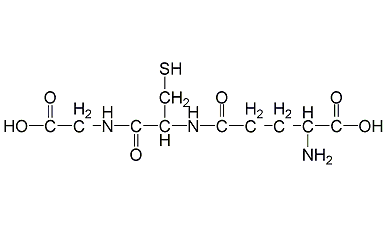
Structural formula
| Business number | 01G0 |
|---|---|
| Molecular formula | C10H17N3O6S |
| Molecular weight | 307.33 |
| label |
5-L-Glutamyl-L-Cysteinylglycine, L-glutathione, glutathione wins, thiofuran, Triamino acid, L-Glutathione reduced, Glutathione, Reduced, Free acid, Glycineγ-L-glutamyl-L-cysteinyl-glycine, N-(N-L-γ-Glutamyl-L-cysteinyl) glycine, GSH, antidote, amino acid drugs, intermediates, Biochemical reagents |
Numbering system
CAS number:70-18-8
MDL number:MFCD00065939
EINECS number:200-725-4
RTECS number:MC0556000
BRN number:1729812
PubChem ID:None
Physical property data
1. Appearance: white crystalline powder
2. Density (g/mL, 25/4℃): 1.441
3. Relative vapor density (g/mL, Air=1): Uncertain
4. Melting point (ºC): 192-195 (dec.)(lit.)
5. Boiling point (ºC, normal pressure): No Determined
6. Boiling point (ºC, 5.2kPa): Uncertain
7. Refractive index: -17 ° (C=2, H2O)
8 . Flash point (ºC): Uncertain
9. Specific rotation (º): -16.5 º (c=2, H2O)
10. Autoignition point or ignition temperature (ºC): Uncertain
11. Vapor pressure (kPa, 25ºC): Uncertain
12. Saturated vapor pressure (kPa, 60ºC): Uncertain
13. Heat of combustion (KJ/mol): Uncertain
14. Critical temperature (ºC): Uncertain
15. Critical pressure (KPa): Uncertain
p>
16. The logarithmic value of the oil-water (octanol/water) partition coefficient: Uncertain
17. The upper limit of explosion (%, V/V): Uncertain
18. Lower explosion limit (%, V/V): Uncertain
19. Solubility: Soluble in water (50 mg/mL), dilute alcohol, liquid ammonia and N-dimethylformamide, Insoluble in ethanol, ether and acetone
Toxicological data
Acute toxicity: smallMouse oral LC50: 5 mg/kg; Mouse intraperitoneal LC50: 4020 mg/kg; Mouse intravenous LC50: 2238 mg/kg; Mouse subcutaneous injection LC50: 5 mg/kg; Mouse intramuscular LC50 : 4 mg/kg; Breeding: Rat oral administration TDLo: 1250 mg/kg plate; mouse liver DNA inhibition test system: 1 mmol/L;
Ecological data
None
Molecular structure data
1. Molar refractive index: 70.10
2. Molar volume (cm3/mol): 213.2
3. Isotonic specific volume (90.2K ): 615.2
4. Surface tension (dyne/cm): 69.3
5. Polarizability (10-24cm3): 27.79
Compute chemical data
1. Reference value for hydrophobic parameter calculation (XlogP): -4.5
2. Number of hydrogen bond donors: 6
3. Number of hydrogen bond acceptors: 8
4. Number of rotatable chemical bonds: 9
5. Number of tautomers: 4
6. Topological molecule polar surface area 160
7. Number of heavy atoms: 20
8. Surface charge: 0
9. Complexity: 389
10. Number of isotope atoms: 0
11. Determine the number of atomic stereocenters: 2
12. Uncertain number of atomic stereocenters: 0
13. Determine the number of chemical bond stereocenters: 0
14. Number of uncertain chemical bond stereocenters: 0
15. Number of covalent bond units: 1
Properties and stability
1. It is the prosthetic group of glyceraldehyde phosphate dehydrogenase, the coenzyme of glyoxalase and triose phosphate dehydrogenase, and participates in tricarboxylic acid in the body. Acid cycle and sugar metabolism
enable the human body to obtain high energy. It can activate sulfhydryl (-SH) enzymes in the body, such as cholinesterase (related to allergic diseases), and protect the body from the poison of heavy metals and epoxy compounds. It can promote the metabolism of carbohydrates, fats and proteins, and can also control the metabolic process of cells. It also has radioactive protection and inhibits melanin deposition.
2. Found in tobacco leaves.
Storage method
This product should be kept sealed. Storage temperature 4ºC
Synthesis method
Widely present in living organisms. It mainly plays the role of redox electron transfer and detoxification in living organisms.
Purpose
1. Used as biochemical reagent, thiolase (protein) protective agent and detoxification drug.
2.It has a protective effect on red blood cell membranes. It can prevent hemolysis, thereby reducing methemoglobin; it can improve the symptoms of bone marrow tissue inflammation caused by radiation therapy, radioactive drugs, and radiation; it can inhibit the formation of fatty liver, and can also improve the symptoms of toxic hepatitis and infectious hepatitis. . It can resist allergies, correct the imbalance of acetylcholine and cholinesterase, prevent skin pigmentation, and is used in ophthalmology to inhibit the instability of crystal protein sulfhydryl groups, inhibit progressive cataracts and control the development of corneal and retinal diseases, etc.
extended-reading:https://www.bdmaee.net/tmg-nnn%e2%80%b2n%e2%80%b2-tetramethylguanidine-cas80-70-6/extended-reading:https://www.cyclohexylamine.net/catalyst-c-225-polyurethane-retardation-catalyst-c-225/extended-reading:https://www.newtopchem.com/archives/44791extended-reading:https://www.newtopchem.com/archives/44635extended-reading:https://www.bdmaee.net/wp-content/uploads/2020/10/149.jpgextended-reading:https://www.newtopchem.com/archives/40316extended-reading:https://www.cyclohexylamine.net/polyurethane-catalyst-smp-catalyst-smp/extended-reading:https://www.bdmaee.net/stannous-octoate-cas-301-10-0-dabco-t-9/extended-reading:https://www.bdmaee.net/butylenestannonic-acid/extended-reading:https://www.cyclohexylamine.net/dibutyldichloro-stannan-cas-683-18-1/


